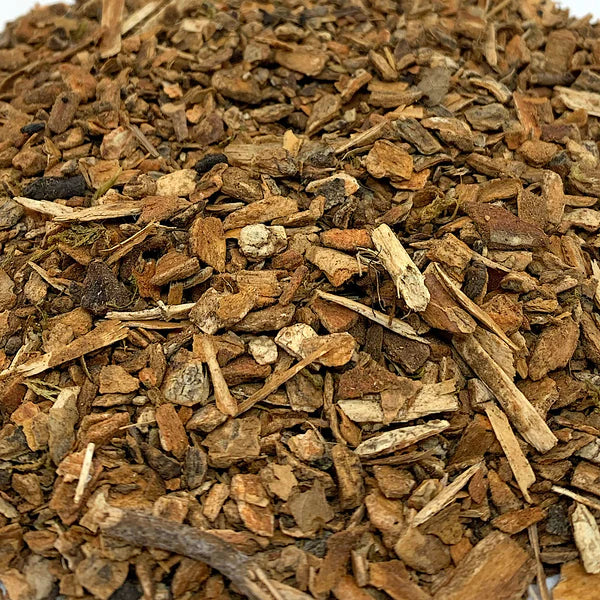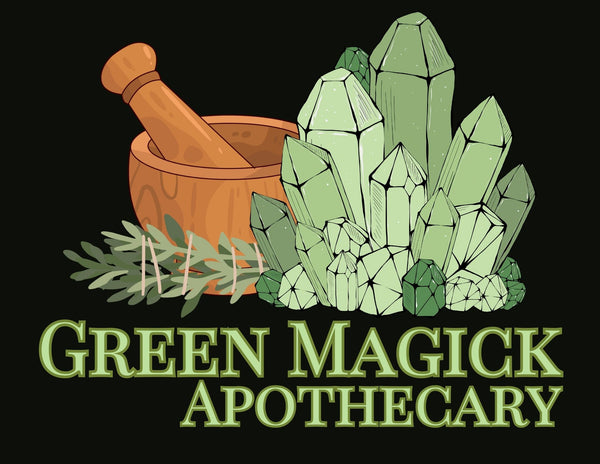
Spotlight on Cramp Bark
The Comfort of the Forest
🌿✨🌕💧
Deep in the quiet forest grows an herb that speaks the language of release—Cramp Bark (Viburnum opulus). For centuries, herbalists have turned to this powerful ally to ease the kinds of tension that bind us up and wear us down: menstrual cramps, backaches, stress knots, and emotional strain.
Cramp Bark is one of nature’s gentlest muscle relaxants. As an antispasmodic and nervine, it supports both body and spirit, calming spasms and softening the nervous system. I reach for it often—especially in my moon cycle blends, and anywhere tension needs to be unwound.
I remember making a tea for my son’s girlfriend during a particularly painful cycle. She was curled up, miserable—and I blended a soothing infusion of Cramp Bark, chamomile, ginger, and lemon balm. The shift was almost immediate. Now, she reaches for it regularly, making it part of her own self-care ritual. That, to me, is the heart of herbal magick: creating comfort that becomes a practice.
And it doesn’t stop at tea—Cramp Bark shines in compresses, too. A warm cloth soaked in Cramp Bark decoction can bring direct relief to the lower back or belly. You’ll also find it in many of our most beloved formulas: it’s woven into the magick of our massage balms and Mystikal Bath soaks, where it works alongside herbs like arnica, comfrey, and peppermint to calm, soothe, and support the body through whatever it’s holding.
Getting to Know Cramp Bark
🌸🌳🧪
Cramp Bark (Viburnum opulus) is a deciduous shrub native to Europe, North America, and parts of Asia. You may also know it by names like Guelder Rose or Snowball Tree, named for its globe-shaped white blooms that appear in late spring. These flowers give way to clusters of red berries in fall—but herbalists prize the bark, harvested in early spring or late fall, when the plant’s energy is rich and ready to offer its medicine.
The bark contains compounds similar to those in valerian root, giving it gentle sedative and muscle-relaxing properties. In traditional medicine, Cramp Bark has been used to ease:

- Menstrual cramps and uterine spasms
- Back pain and muscle tension
- Asthma and bronchial spasms
- Nervous system overload
- Postpartum recovery
- Even mild hypertension
Visually, Cramp Bark is beautiful in every season—but it’s what lies beneath the surface that makes it a true healer.
Within the bark flows the plant’s quiet strength—compounds that gently relax the body, settle the nerves, and offer a soft landing during moments of pain or overwhelm. Beneath the delicate blossoms and bright berries is a medicine rooted in resilience. Cramp Bark reminds us that healing isn’t always loud or forceful—it can be tender, grounded, and deeply restorative.
Spirit + Elemental Magick
💧🕯️✨
Cramp Bark is ruled by the element of water and resonates with the sacral chakra, making it a powerful ally for:
- Emotional release
- Womb healing
- Ritual rest
- Shadow work
- Reconnecting to flow
Include it in moon cycle ceremonies, herbal baths, or intentional rest rituals. It teaches us to soften, to release, and to surrender what no longer serves.
Ways to Work with Cramp Bark
🍵🛁🌙
- Tea or tincture for cramps, tension, or overwhelm
- Compress over the lower belly or back
- Massage balm for tight muscles and emotional holding
- Herbal bath or ritual soak for softening body + spirit
Please note: Cramp Bark is generally safe but not recommended during pregnancy unless under the care of a qualified practitioner.
Cramp Bark has taught me that healing doesn’t have to be forceful. That softness is strength. And that sometimes, the most powerful thing we can do… is simply allow ourselves to let go.
It reminds us that comfort is a form of care, and that even in our most tender, aching moments, the earth has provided allies to walk beside us. Not to rush us through the pain, but to hold space for our release.
In a world that often demands we keep going, Cramp Bark whispers: rest.
In the grip of discomfort, it offers a balm, a breath, a return to center.
It’s a plant I will always keep close—and one I encourage you to get to know, whether for your body, your spirit, or someone you love.
Because every witch, healer, and human deserves a ritual of release.
And Cramp Bark is one of the kindest ways I know to begin.
🌿
